“We were looking for a viable solution to use surplus productions, but we did not want a product with an already saturated market, such as juices, or that wasn't natural. This is how we came up with the 'Fruta de cuchara' ('Spoon fruit'), which we launched in 2006,” says Xavier Bosch, head of the Anela plantations and son of the founders.
"Fruit with a bad appearance is not accepted in the fresh market merely for aesthetic reasons; however, the flavor, nutrients and texture remain intact." We got the idea of using those surplus apples and premium pears to create a compote that would be served in traditional tubs," says Xavier.
These tubs have reached the shelves of numerous European stores, mainly in Germany and Belgium. “Outside Europe, customers appreciate quality more than prices. Asia and the Middle East are new channels with potential. In Europe we have all the ingredients to continue producing excellent fruit and vegetables, but the market is affected by the demand for low prices,” says Esteve Bosch, head of marketing and son of the founders.
Anela is a company with numerous certifications and that handles the entire process, from tree nursery to planting, processing and marketing. “People are surprised to discover that we do everything, from A to Z, but being a centralized family business with short lines is our strongest point; it results in proximity to the product, but also to the customer. It is also the only way to fully guarantee the fruit's traceability.”
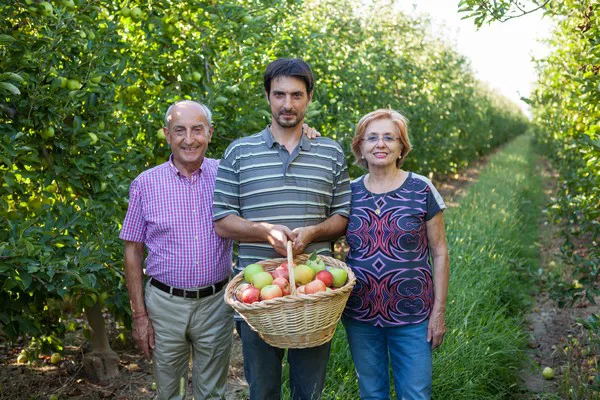 Esteve Bosch; Xavier Bosch and Teresa Farré, two generations
Esteve Bosch; Xavier Bosch and Teresa Farré, two generations
"Consumers decide what fruit and what product they want to consume"
The best example of the pull system, in which the consumer asks the producer what to grow, has been that of Anela. “We entered a market with multinationals producing large quantities, but no 100% natural products with optimal flavor and texture. The tubs are not an industrial product; they are manufactured on a large scale, but just as they would be at home, in a water bath. We don't add any juice or ascorbic acid to make the product cheaper,” says Esteve Bosch.
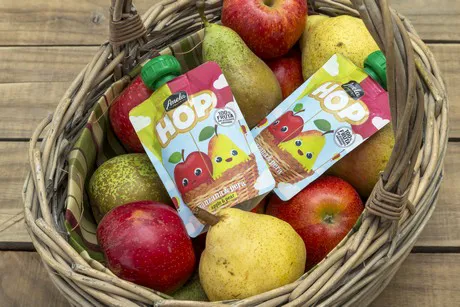
HOP is the Anela ‘spoonless’ product that is not only consumed by children, but also adults: “The vending and snacking trends are making it popular with all types of consumers. Many athletes simply want fruit, but it is easier to carry HOP than pieces of fruit.”
The company is in charge of all processes, from cultivation to transformation and marketing. According to Esteve, centralizing all processes leads to greater traceability, quality and closeness with the consumer, making it possible to meet the needs of an increasingly demanding market. "We also hope to gradually transform our entire apple acreage to organic production," he says.
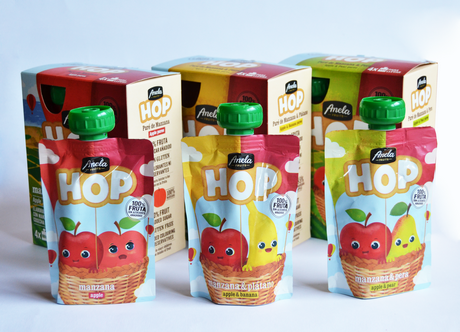
"Working constantly and a powerful network yield results"
With almost half a century of history, the Anela company continues innovating while remaining a family business. “Fresh fruit has its market limits and channels. Innovation is necessary, and this is possible even in saturated markets. There are lots of tubs and pouches, but very few contain a natural product, with optimal flavor and textures. Our apple and pear varieties are specific and unique. Likewise, the fruit that we do not grow, such as bananas or mangoes, comes from the best producers and are of very specific varieties,” said Esteve Bosch and Teresa Farré.
“There is no secret; it is the result of years spent observing the work of others, testing and innovating until you find the ideal product, and also reaching the customer directly. We participate in all fairs and offer tastings of our products. This is enough to persuade people. The only factor that can stop them is the price, but a good product cannot be just given away. In Europe, the pressure on prices is huge. This makes it necessary to open new channels with a greater focus on quality. With processed and ready-to-eat products, it is easy to export to distant destinations. This isn't the case for fresh fruit,” says Esteve Bosch.
The family business Anela Fruits, based in the regions of Alto Ampurdán, La Selva and El Gironés, has almost half a century of experience. Its pears and apples grow in a particularly fertile land between sea and mountains.
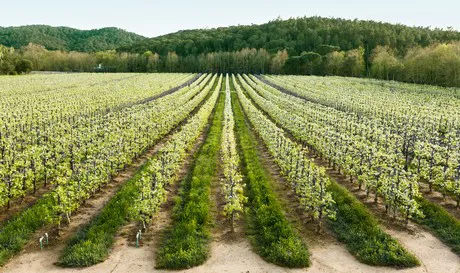
Its 250 hectares of apples and young pears are of unique varieties. “We have obtained a very specific variety with a unique flavor and a high Brix. These natural sugars make adding other products unnecessary,” says co-founder Teresa Farré.
In 2006, the year when the compote tubs were launched, the Department of Agriculture of the Government of Catalonia awarded them the Agricultural Technology Innovation Award for their work creating an innovative and 100% natural product.
In 2019, they won the Prize for the best export initiative of the Girona Chamber of Commerce.
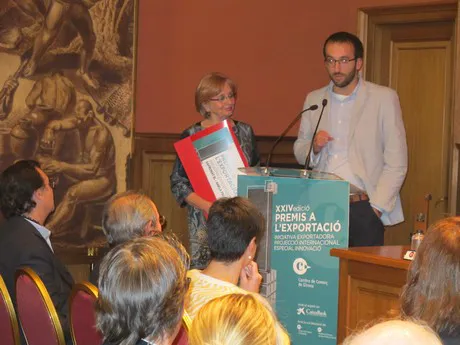 Teresa Farré and Esteve Bosch accepting the Prize for the best export initiative of the Girona Chamber of Commerce
Teresa Farré and Esteve Bosch accepting the Prize for the best export initiative of the Girona Chamber of Commerce
“This year, with the introduction of the Anela HOP pouch format, we want to encourage the consumption of fruit. We are what we eat, so it seems important to offer the consumer the best quality,” says Esteve Bosch.
Anela will be present at Foodex Japan 2020 between March 10 and 13.
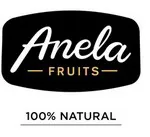 More information:
More information:
Anela Fruits
Camí de Fornells, 4
17459 Campllong
(Girona) España
+34 972 464 973
anela@anelafruits.com
www.anelafruits.com
